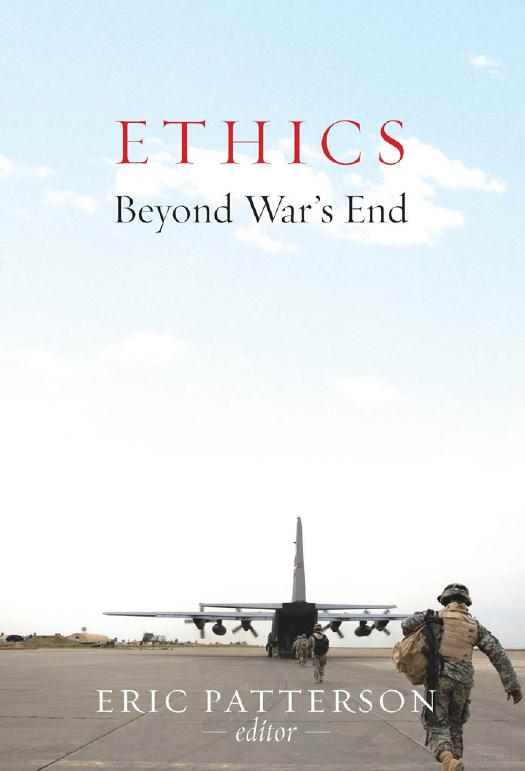Ethics Beyond War's End by Eric Patterson

Author:Eric Patterson [Patterson, Eric]
Language: eng
Format: epub, pdf
Tags: International Relations, Philosophy, Ethics & Moral Philosophy, Political Science, General
ISBN: 9781589018976
Google: 8aeAfzUEvbsC
Goodreads: 17066019
Publisher: Georgetown University Press
Published: 2012-03-02T08:37:51+00:00
An Ethic of Responsibility
Many questions immediately arise when one speaks of an ethic of responsibility: responsibility to whom? And over what? If our responsibilities are infiniteâideas of universal justiceâwe can never get a handle on ideas and events. We drift into the universal ether in which everyone is somehow responsible for everything. The just war tradition concretizes one area of responsibility: the responsibility of statesmen and stateswomen for their polities; the responsibility of one polity for another; the shared responsibility of all states to a system that helps to sustain a world of diverse bodies politic.
PostâWorld War II, this ethics of responsibility got built up on the ground of the universality of human rights, shared revulsion of genocide, and the cry of ânever againâ where certain horrors were concerned. This resulted in a series of legal and moral commitments such as the UN Charter, the Universal Declaration of Human Rights, the Geneva Conventions, and the Convention on Torture. With the Cold Warâs end, we should not be surprised, therefore, that a new period of disorder ensued as characterized by the killing fields of Bosnia and Rwanda. This resulted in the return of that theme of responsibility once again, articulated as the Responsibility to Protect (R2P) under the aegis of the United Nations. This ethic holds that should a nation or group of nations be the victims of systematic, egregious, and continuing violence, the international community has a responsibility to do something about that situation. If the UN refuses to act, it follows that a member state or states, if there is a widely shared consensus on the horrors being perpetrated, may act legitimately to interdict the violence and to contain the horror.3
Because it is always a good bet that the UN will be paralyzed, and because the European powers often talk a good game but are prepared to do very little by way of humanitarian intervention, as it is now called, even in situations where one could make a strong case that they are historically implicated (Rwanda would be a powerful case in point), it follows that it is often the United States, as the state with more power to project its power than any other, may be called upon or call upon itself to act. Be that as it may, this underlying norm of responsibility, with the Universal Declaration of Human Rights and the Genocide Convention as backdrop, is one feature of an overall ethics of responsibility.
To these statements of political responsibility one must add the just war tradition. What does just war theory tell us about the goals or ends of war? How are these related to an ethics of responsibility, including an ethics of exit if one has intervened in a given situation? The end of war must be related intrinsically to the argument for the deployment of armed force in the first place, namely to repair or remedy a major injustice or act of aggression and punish aggressors. Another just cause might be to prevent nigh-certain
Download
This site does not store any files on its server. We only index and link to content provided by other sites. Please contact the content providers to delete copyright contents if any and email us, we'll remove relevant links or contents immediately.
| Arms Control | Diplomacy |
| Security | Trades & Tariffs |
| Treaties | African |
| Asian | Australian & Oceanian |
| Canadian | Caribbean & Latin American |
| European | Middle Eastern |
| Russian & Former Soviet Union |
The Secret History by Donna Tartt(19086)
The Social Justice Warrior Handbook by Lisa De Pasquale(12190)
Thirteen Reasons Why by Jay Asher(8909)
This Is How You Lose Her by Junot Diaz(6885)
Weapons of Math Destruction by Cathy O'Neil(6279)
Zero to One by Peter Thiel(5801)
Beartown by Fredrik Backman(5754)
The Myth of the Strong Leader by Archie Brown(5507)
The Fire Next Time by James Baldwin(5442)
How Democracies Die by Steven Levitsky & Daniel Ziblatt(5218)
Promise Me, Dad by Joe Biden(5153)
Stone's Rules by Roger Stone(5087)
A Higher Loyalty: Truth, Lies, and Leadership by James Comey(4960)
100 Deadly Skills by Clint Emerson(4924)
Rise and Kill First by Ronen Bergman(4788)
Secrecy World by Jake Bernstein(4752)
The David Icke Guide to the Global Conspiracy (and how to end it) by David Icke(4717)
The Farm by Tom Rob Smith(4507)
The Doomsday Machine by Daniel Ellsberg(4490)
